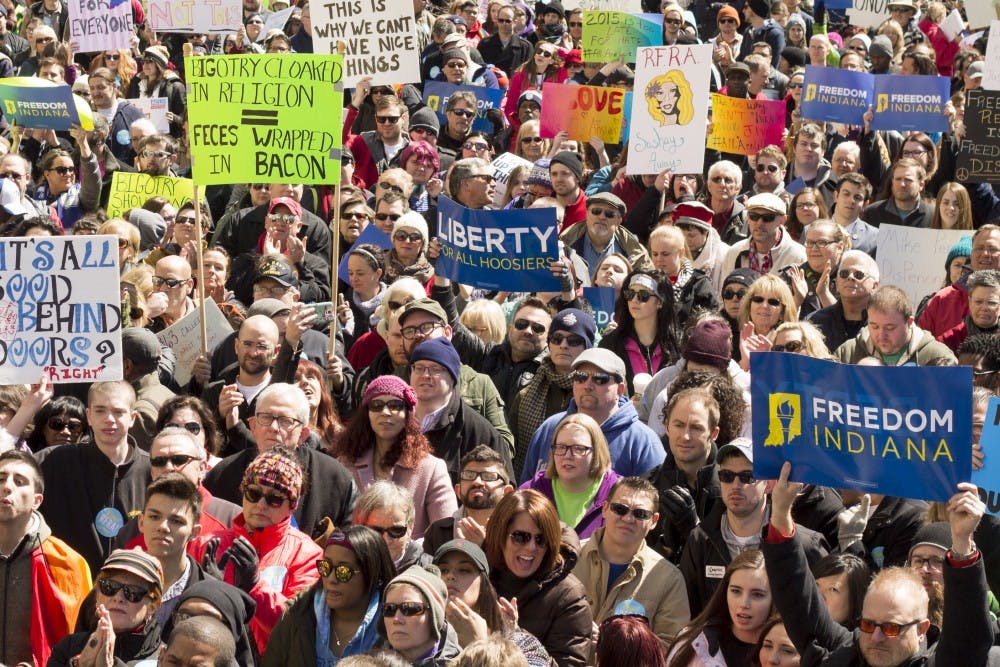Contact Sen. Travis Holdman at 317-232-9400 or senator.Holdman@iga.in.gov.
A proposed bill is aiming to protect personal rights as well as religious freedoms in Indiana.
Indiana Senate Republicans proposed Senate Bill 100 on Nov. 17 to add sexual orientation and gender identity to the state’s civil rights protections.
Exemptions in the bill could allow schools, employers and others to determine restroom policies for transgender people, refuse wedding series to same-sex couples and let religious-affiliated adoption agencies reject same-sex couples as parents.
Sen. Travis Holdman said he wrote the bill to find a balance between religious liberties and LGBT civil rights.
“By adding gender identity and sexual orientation to Indiana’s civil rights code, LGBT Hoosiers will be protected from being discriminated against in employment, as well as housing, public accommodations, education and access to credit," Holdman said in an email. "There are certain protections for religious organizations, clergy and businesses with fewer than four full-time employees that offer wedding-related services such as photography or marriage counseling."
The protections for religious organizations has been controversial. Freedom Indiana, a statewide organization which backs civil rights for gay and transgender people, have publicly expressed their concerns.
“Some of those concerns include the fact that the legislation would prohibit cities and towns from enforcing existing or adding meaningful local civil rights protections to achieve fair treatment of their residents and as an economic development tool,” Chris Paulsen, Freedom Indiana campaign manager, said in a press release.
Freedom Indiana isn’t the only organization to raise concerns. Lambda Legal, an LGBT rights organization, said the bill allows for further discrimination.
Lambda Legal argued in a blog that the legislation will set Indiana’s civil rights movement backward.
“Unfortunately, the bill that was introduced provides little meaningful protection from discrimination for transgender people and includes damaging carve-outs and exemptions targeting all LGBT people in Indiana," the blog said. "The bill also would roll back some existing protections from discrimination, not just for LGBT people but for all people who rely on broader local civil rights laws in the state—whether based on race, sex, disability or other protected characteristics."
Holdman said the bill would not further discrimination against any group of people.
“Under this bill, every Hoosier in every Indiana community will live with the same civil rights laws," Holdman said. "Many consider this to be one of the most difficult issues members of the General Assembly will debate. The questions that my colleagues will be debating are extremely complex. Others can debate and discuss these issues in theory. Lawmakers have the job of forming workable public policy. Sometimes that is difficult to do."
Sophomore telecommunications major Austin Wuethrich said he thinks the bill is a happy medium.
“It seems smart to clarify things early and establish what rules are going to be set, so it makes sense that they did all this at once," Wuethrich said. "I wouldn’t add anything. It seems fair on both sides of things.”
Freshman pre-nursing major Alexis Anderson disagreed. She said she hopes the religious exemptions will be removed in the future.
“Don’t get me wrong, many religious books have a lot of good messages, but what’s being covered in the new law is not something someone can control or choose," Anderson said. "If a person knows deep down that they’re a different gender or attracted to the same [sex], it’s not something they wake up to say, ‘Oh, I'm going to be gay now.’”
Removing the religious freedom section is something Holdman said he would be willing to consider, as long as the bill protects both religious freedom and civil rights.
But for graduate student Elise Lockwood, the whole thing is “ridiculous.”
“I think it’s ridiculous that it is not already included," Lockwood said. "However, I also think there are some questionable causes in the bill that provide exemptions for small business in the case of weddings for gay couples, and that just makes it even more ridiculous."
Holdman said he recognizes this is an emotional issue and hopes everyone can be respectful. He said he would be willing to talk with Ball State students about SB100 if they please.
“Hearing their thoughts, concerns and ideas regarding the issue would be helpful,” Holdman said. "I hope that the debate on this bill can occur in a respectful fashion without either side demonizing one another. I sincerely believe that there is room for both religious liberty and LGBT civil rights to coexist."




